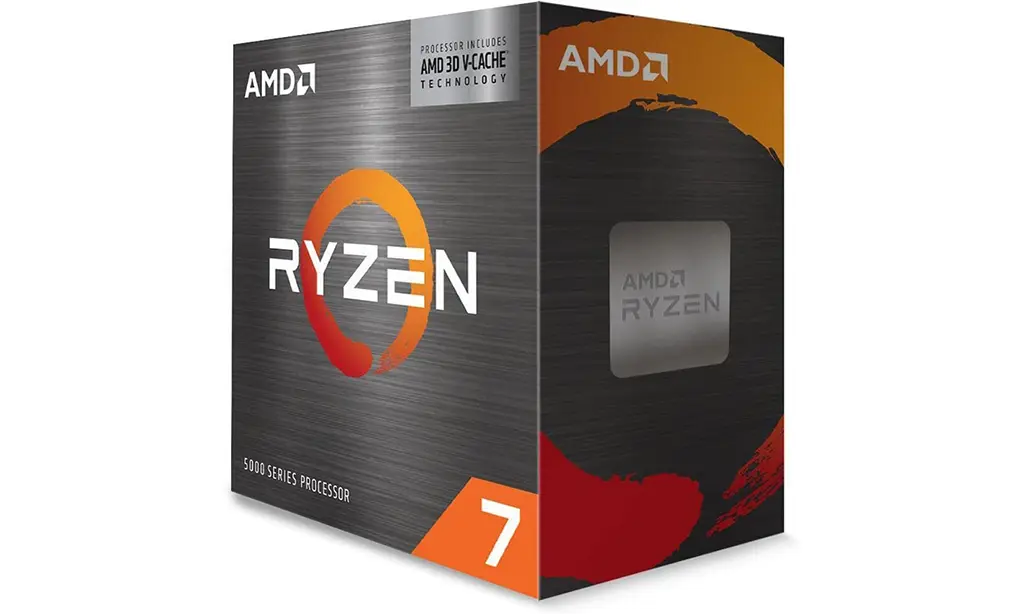When we initially reviewed the AMD Ryzen 7 5800X3D, we were hoping for a price closer to $400 or maybe a little below, but when it’s currently retailing for $430, which is nearly $150 more than the Ryzen 7 5800X. That’s a serious amount of cash and it not only pushes the price of the 5800X3D close to the cost of the mighty 16-core Ryzen 9 5950X, but it’s much more expensive than the Ryzen 9 5900X and Core i7-12700K too.
That’s a lot of money for an 8-core, 16-thread CPU based on an aging architecture, but the Ryzen 7 5800X3D isn’t any old Zen 3 CPU. It sports a massive 96MB L3 cache, two thirds of which is made up of 3D V-Cache. This AMD RYZEN 7 5800X3D/£430inc VAT SUPPLIER overclockers.co.uk is stacked directly on top of a core chiplet die, specifically above the existing L3 cache.
The benefit of more cache means less time accessing system memory, which in turn cuts latency. This latency has been the cause of AMD’s lackluster performance in games in the past, which improved with Zen 3 and, as we saw last issue, was bettered further by 3D V-Cache.
It comes at a cost, though, as AMD has had to rein in the boosting frequencies to deal with the extra heat created by stacking the cache on top of the chiplet, and our sample certainly proved to be a toasty customer. The result is a 4.5GHz peak boost frequency, which is 200MHz slower than that of the Ryzen 7 5800X, and it could only reach 4.2GHz across all cores in multi-threaded applications. That’s a deficit of up to 300MHz compared to the Ryzen 7 5800X.
The reduced latency certainly benefits some applications, but not all, so with reduced clock speeds, it’s likely to be noticeably slower in some tasks than the significantly cheaper Ryzen 7 5800X.
Delving into the numbers, the 5800X3D was 3 per cent slower than the 5800X in our image editing and video encoding tests, but the multi-tasking test benefited from the extra cache – it was a long way behind the Core i7-12700K here though.
Cinebench was less forgiving, with an 8 per cent deficit to the Ryzen 7 5800X in the multi-threaded test, and the 5800X3D had the lowest single-threaded score of any CPU this month too. It was also a huge amount slower than the Core i7-12700K in Cinebench.
We’re currently unable to overclock the Ryzen 7 5800X3D, so both the Ryzen 7 5700X and Ryzen 7 5800X leapfrogged it in the system score when overclocked, while both these CPUs and the Core i7-12700K extended their leads in Cinebench.
Thankfully, AMD’s claims about improved gaming performance were justified, as the 5800X3D was the fastest CPU in Far Cry 6, even bettering the Core i9-12900KS and adding over 10fps to the result of the Ryzen 7 5800X. It was by far the fastest AMD CPU in Watch Dogs: Legion too, but it wasn’t quite as quick as the Core i7-12700K.
Specifications
Base frequency 3.4GHz Max boost frequency 4.5GHz Core Zen 3 Manufacturing process 7nm Number of cores 8 x physical (16 threads) IGP None Simultaneous Multithreading Yes Cache 96MB L3, 4MB L2 Memory controller Dual-channel DDR4, up to 3200MHz Packaging AMD Socket AM4 Thermal design power (TDP) 105W Features Precision Boost 2, Precision Boost Overdrive 2, FMA3, F16C, SHA, BMI / BMI1 + BMI2, AVX2, AVX, AES, SSE4a, SSE4, SSSE3, SSE3, SSE2, SSE
Conclusion
The addition of 3D V-Cache makes the Ryzen 7 5800X3D by far the fastest AMD CPU in games yet, but its reduced overall performance elsewhere means it isn’t a great all-rounder. The Core i7-12700K is significantly quicker in most tests, and in some games, making it the better option for a new system. However, if you’re upgrading a Socket AM4 system, and you’re primarily concerned with games, the Ryzen 7 5800X3D is a potent if overpriced upgrade.
+Pros + Faster than Intel in games + Compatible with old Socket AM4 boards + Cheaper than Core i9-12900K -Cons - Poor content creation performance - High internal temperatures - No overclocking


